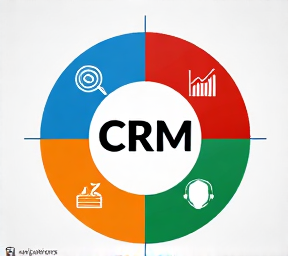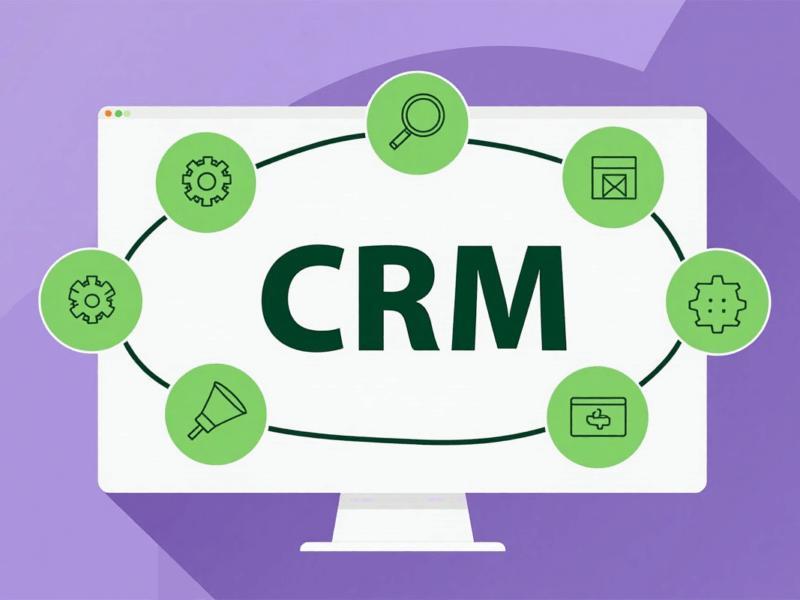Artificial Intelligence and CRM in 2025: How to Maximize AI in Customer Management
As we move into 2025, the integration of Artificial Intelligence (AI) with Customer Relationship Management (CRM) software is revolutionizing the way businesses manage customer relationships. The combination of these technologies not only enhances efficiency but also allows for a more personalized customer experience. In this article, we will explore the best practices for leveraging AI within CRM systems, the benefits of this integration, and how businesses can prepare for the future.
Understanding CRM and AI
What is CRM?
Customer Relationship Management (CRM) refers to the strategies and technologies that companies use to manage interactions with potential and current customers. A CRM system helps organizations streamline processes, improve customer service, and increase profitability by centralizing customer data and interactions.
What is AI?
Artificial Intelligence (AI) involves the simulation of human intelligence in machines programmed to think and learn. In the context of CRM, AI can analyze vast amounts of data to provide insights, automate tasks, and predict customer behavior.
The Importance of Integrating AI with CRM
Enhanced Customer Insights
Integrating AI with CRM systems allows businesses to gain deeper insights into customer behavior and preferences. By analyzing data patterns, AI can help identify trends that inform marketing strategies and product development.
Benefits of Enhanced Insights
- Targeted Marketing: Businesses can create personalized marketing campaigns based on customer behavior.
- Improved Customer Retention: Understanding customer needs leads to better service, reducing churn rates.
- Data-Driven Decisions: Businesses can make informed decisions based on accurate data analysis.
Automation of Routine Tasks
AI can automate repetitive tasks within CRM systems, such as data entry, lead scoring, and follow-up reminders. This automation frees up valuable time for employees to focus on more strategic activities.
Examples of Automated Tasks
- Lead Scoring: AI algorithms can evaluate leads based on their likelihood to convert.
- Customer Follow-Ups: Automated reminders ensure timely communication with customers.
- Data Entry: AI can extract information from emails or forms, reducing manual input errors.
Improved Customer Experience
With AI-powered CRM systems, businesses can provide a more personalized experience for their customers. AI can analyze past interactions to tailor communications and recommendations.
Personalization Strategies
- Dynamic Content: Use AI to adjust marketing content based on individual customer preferences.
- Chatbots: Implement AI chatbots for 24/7 customer support that understands and responds to inquiries in real-time.
- Predictive Analytics: Anticipate customer needs based on historical data and behavioral patterns.
Best Practices for Integrating AI into CRM Systems
1. Define Clear Objectives
Before integrating AI into your CRM system, it’s crucial to define clear objectives. Determine what you want to achieve with this integration, whether it’s improving customer service response times or enhancing lead conversion rates.
Key Questions to Consider
- What specific outcomes do you want from the integration?
- How will you measure success?
- What resources do you need for implementation?
2. Choose the Right Tools
Select a CRM system that offers robust AI capabilities or integrates seamlessly with third-party AI tools. Look for software that provides features such as predictive analytics, machine learning algorithms, and natural language processing (NLP).
Recommended CRM Tools with AI Features
- Salesforce Einstein: Offers advanced analytics and predictive capabilities.
- HubSpot CRM: Integrates well with various marketing automation tools and provides valuable insights.
- Zoho CRM: Features an AI assistant named Zia that helps with data analysis and task automation.
3. Ensure Data Quality
Data quality is critical for successful AI integration. Ensure that your customer data is accurate, complete, and up-to-date before implementing any AI solutions.
Tips for Maintaining Data Quality
- Regular Audits: Conduct regular audits of your data to identify inconsistencies.
- Standardization: Use standardized formats for data entry to reduce errors.
- Validation Rules: Implement validation rules within your forms to ensure accurate data collection.
4. Train Your Team
Invest in training sessions for employees to familiarize them with both the CRM system and the new AI features. Comprehensive training ensures that staff understands how to leverage these tools effectively.
Training Topics to Cover
- System Navigation
- Data Entry Best Practices
- Campaign Creation and Management
- Reporting and Analytics Interpretation
5. Monitor Performance Metrics
After integrating AI into your CRM system, continuously monitor performance metrics related to customer service outcomes. Analyzing these metrics will help identify areas for improvement.
Key Metrics to Track
- Conversion Rates: Measure how many leads convert into customers.
- Engagement Rates: Track how engaged your audience is with your campaigns.
- ROI Analysis: Evaluate the return on investment for your integrated efforts.
6. Foster a Culture of Innovation
Encourage a culture of innovation within your organization by promoting experimentation with new technologies. Embrace feedback from employees who use the CRM system daily, as they can provide valuable insights into potential improvements.
Strategies for Fostering Innovation
- Regular Brainstorming Sessions: Hold meetings where team members can share ideas on using AI effectively.
- Pilot Programs: Test new features or tools before full-scale implementation.
- Feedback Loops: Create channels for employees to provide feedback on their experiences with the integrated system.
The Future of AI in CRM Systems
As we look toward 2025, several trends are emerging that will shape the future of AI in CRM systems:
1. Advanced Predictive Analytics
Predictive analytics will become increasingly sophisticated, allowing businesses to anticipate customer needs more accurately than ever before. By leveraging machine learning algorithms, companies can analyze vast amounts of data to forecast trends and behaviors.
Benefits of Predictive Analytics
- Proactive Engagement: Reach out to customers before they express a need or concern.
- Resource Allocation: Optimize marketing spend by targeting high-potential leads more effectively.
2. Natural Language Processing (NLP)
NLP technology will enhance communication between businesses and customers by enabling machines to understand human language more effectively. This will improve chatbots’ capabilities in handling complex inquiries.
Applications of NLP in CRM
- Sentiment Analysis: Gauge customer sentiment from social media interactions or reviews.
- Voice Recognition: Allow customers to interact with CRMs using voice commands for a more seamless experience.
3. Integration with IoT Devices
The Internet of Things (IoT) will play a significant role in how businesses collect data about their customers. Integrating IoT devices with CRM systems will provide real-time insights into customer behavior.
Advantages of IoT Integration
- Real-Time Data Collection: Gather data from connected devices instantly.
- Enhanced Personalization: Use IoT data to tailor recommendations based on actual usage patterns.
Conclusion
Integrating Artificial Intelligence with Customer Relationship Management software is no longer just an option; it’s a necessity for businesses looking to thrive in today’s competitive landscape. By following best practices such as defining clear objectives, choosing the right tools, ensuring data quality, training your team, monitoring performance metrics, and fostering a culture of innovation, organizations can maximize their investment in these technologies.As we move towards 2025, embracing advancements like predictive analytics, natural language processing, and IoT integration will further enhance the capabilities of CRM systems. This evolution will enable businesses not only to meet but exceed customer expectations through personalized experiences and proactive engagement strategies.By leveraging these innovative technologies effectively, organizations can build stronger relationships with their customers while driving growth and success in an increasingly digital world.


